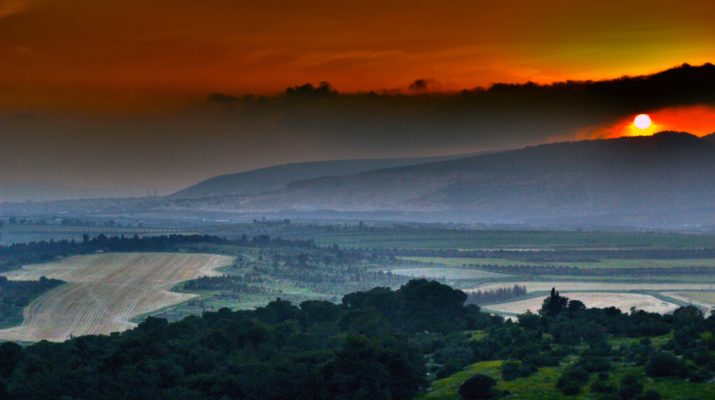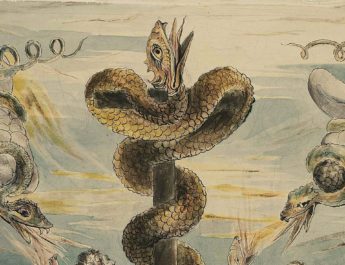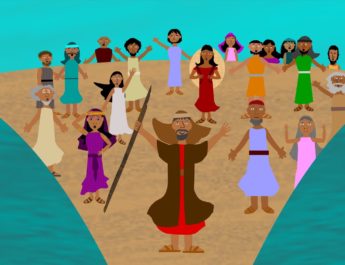Psalm 136
BibleHub
1 O give thanksA to the Lord,B for he is good,C
Notes on verse 1a
A “give thanks” = yadah. From yad (hand). This is to throw one’s hands into the air in a gesture of praise. So, it is to praise, give thanks, or make a confession.
B “Lord” = YHVH. From havah (to be, become) or hayah (to come to pass, become, be). This is the name of the God of Israel, the self-existent and eternal one, the tetragrammaton. This pronunciation has been lost to time so “Lord” is generally used in its place.
C “good” = tob. From tob (to be pleasing, to be good). This is good, beautiful, pleasant, agreeable, bountiful, at ease. This word is used for goodness as a concept, a good thing, a good person. This can refer to prosperity and welfare as well as joy, kindness, sweetness, and graciousness. So, this is ethically good, but also enjoyably good.
for his steadfast loveD endures forever.E
2 O give thanks to the GodF of gods,G
for his steadfast love endures forever.
3 O give thanks to the LordH of lords,I
for his steadfast love endures forever;
Notes on verses 1b-3
D “steadfast love” = chesed. From chasad (being good, kind, merciful; may mean bowing one’s neck as is done in the presence of an equal for courtesy’s sake; so, if one in a superior position is treating you like an equal, that is what is captured here). This is favor, goodness, kindness, loving kindness, pity, reproach, or a good deed. When done by God to humanity, this is mercy/loving kindness. When done by humanity to God, it is piety.
E “forever” = olam. This is a long scope of time whether in the past (antiquity, ancient time) or in the future (eternal, everlasting).
F “God” = Elohim.
G “gods” = elohim. Same as “God” in v2. See note F above.
H “Lord” = Adon. From a root that means ruling or being sovereign. This is lord, master, or owner.
I “lords” = adon. Same as “Lord” in v3. See note H above.
4 who aloneJ doesK greatL wonders,M
for his steadfast love endures forever;
Notes on verse 4
J “alone” = bad. From badad (to divide or be separated; alone, solitary, lonely, isolated, straggler). This is apart, alone, separation, body part, tree branch, except. It can also be a city’s chief.
K “does” = asah. This is to make, do, act, appoint, become in many senses.
L “great” = gadol. From gadal (to grow up, become great, become wealthy – to advance. The root meaning may be to twist in the sense of the process of growing). This is great, high, bigger, noble, old, marvelous. It can also refer to someone who is powerful or distinguished.
M “wonders” = pala. From pele (wonder, miracle, wonderful, marvelous thing). This is to be extraordinary, to arise, to be great or accomplish.
5 who by understandingN madeO the heavens,P
for his steadfast love endures forever;
Notes on verse 5
N “understanding” = tebunah. From bin (to discern, consider, attend to; distinguishing things in one’s mind or, more generally, to understand). This is understanding, discernment, discretion, intelligence, skill, fruit, an argument.
O “made” = asah. Same as “does” in v4. See note K above.
P “heavens” = shamayim. Root may mean being lofty. This is sky, the air, or heaven. It is in a dual noun form so this might refer to the part of the sky where the clouds move on the one hand and the part beyond that where the sun, moon, and stars are on the other hand.
6 who spread outQ the earthR on the waters,S
for his steadfast love endures forever;
7 who made the great lights,T
for his steadfast love endures forever;
Notes on verses 6-7
Q “spread out” = raqa. 11x in OT. This is to beat the earth in a fit of passion. By analogy, it is to hammer something so that it is spread out or spread thin. By extension, it is decoratively overlaying something with metal.
R “earth” = erets. Root may mean to be firm. This is earth, ground, field land, or country.
S “waters” = mayim. This is water, waters, or waterway in a general sense. Figuratively, it can also mean juice, urine, or semen.
T “lights” = or. From or (to be or become light). This is light, sun, sunshine, dawn, or daylight. Figuratively, it can refer to light from instruction, light of a face (that is to say one that is cheerful or finds favor). It can refer to prosperity or salvation; a light that guides, a light eternal from Zion.
8 the sunU to ruleV over the day,W
for his steadfast love endures forever;
9 the moonX and starsY to rule over the night,Z
for his steadfast love endures forever;
Notes on verses 8-9
U “sun” = shemesh. This is sun or toward the east. Its root may mean being brilliant. Figuratively, this could be a ray or an arch.
V “rule” = memshalah. 14x in OT. From mimshal (dominion, ruler, authority); from mashal (to rule, reign, govern, have authority, wield). This is to rule, govern, a ream, ruler, authority, dominion, forces.
W “day” = yom. Root may mean being hot. This is the day in a literal or figurative sense. It can also mean birth, age, daylight, continually or other references to time.
X “moon” = yareach. Perhaps from the same as yerach (month). This is moon.
Y “stars” = kokab. Perhaps from the same as kavah (to prick, blister, burn, scorch). This is a star as shining, stargaze. Figuratively, can mean prince.
Z “night” = layil. Properly, this refers to light twisting away. It is used for night or midnight. Figuratively, this can mean adversity.
10 who struckAA EgyptBB through their firstborn,CC
for his steadfast love endures forever;
11 and brought IsraelDD outEE from amongFF them,
for his steadfast love endures forever;
Notes on verses 10-11
AA “struck” = nakah. This is to hit whether lightly or severely. It can be used in a literal or figurative sense. So, this could be beat, punish, give wounds, kill, or slaughter.
BB “Egypt” = Mitsrayim. Perhaps from matsor (besieged or fortified place, bulwark, entrenchment; something hemmed in; a siege or distress or fastness); from tsur (to confine, besiege, to cramp). This is Egypt.
CC “firstborn” = bekor. From bakar (to bear fruit, be firstborn, firstling, that which opens the womb, give the birthright to). This is firstborn or chief.
DD “Israel” = Yisrael. Related to “God” in v2. From sarah (to persist, exert oneself, contend, persevere, wrestle, prevail) + el (see note F above). This is Israel, meaning God strives or one who strives with God; new name for Jacob and for his offspring. This refers to the people and to the land.
EE “brought…out” = yatsa. This is to go or come out, bring forth, appear. It is to go out in a literal or figurative sense.
FF “among” = tavek. This is among, middle, in the midst, the center. Perhaps, properly, to sever.
12 with a strongGG handHH and an outstretchedII arm,JJ
for his steadfast love endures forever;
Notes on verse 12
GG “strong” = chazaq. From chazaq (to strengthen, seize, be courageous, repair, bind, heal, conquer, harden). This is strong, hard, powerful, loud, bold, violent, impudent. It is usually strong in a negative sense.
HH “hand” = yad. This is hand, ability, power. Hand in a literal sense, but also what one can do or the means by which one does it.
II “outstretched” = natah. This is to stretch or spread out, to extend, or bend. In can also imply moral deflection.
JJ “arm” = zeroa. Perhaps from zara (to sow, scatter seed, conceive). This is the arm, shoulder, or foreleg of an animal. It is figuratively used for power, force, might, or help.
13 who dividedKK the RedLL SeaMM in two,NN
for his steadfast love endures forever;
Notes on verse 13
KK “divided” = gazar. 13x in OT. This is to cut or cut down. Used figuratively, it can mean to divide, exclude, decree, or destroy.
LL “Red” = suph. Perhaps from Egyptian twfi (reeds). This is reeds or rushes. It can be used particularly to refer to papyrus, or a flag. This is https://www.abarim-publications.com/Dictionary/sa/sa-p-pfin.html#.XzHCuChKhPY
MM “Sea” = yam. Root may mean to roar. This is the sea, often referring to the Mediterranean. It comes from the root in the sense of the roar of crashing surf. This word is sometimes used for rivers or other sources of water. It can mean to the west or to the south.
NN “two” = gezer. Related to “divided” in v13. 2x in OT. From gazar (see note KK above). This is a part, piece, or portion.
14 and made Israel passOO through the midstPP of it,
for his steadfast love endures forever;
15 but overthrewQQ PharaohRR and his armySS in the Red Sea,
for his steadfast love endures forever;
Notes on verses 14-15
OO “pass” = abar. This is to pass over or cross over. It is used for transitions, whether literal or figurative. It can also mean to escape, alienate, or fail. This is the root verb from which “Hebrew” is drawn.
PP “midst” = tavek. Same as “among” in v11. See note FF above.
QQ “overthrew” = naar. 11x in OT This is to shake, toss up and down, tumble around, overthrow, shake off.
RR “Pharaoh” = Paroh. From Egyptian pr (palace, pharaoh; literally house + great). This is Pharaoh, a title for Egyptian kings. See https://en.wiktionary.org/wiki/pharaoh
SS “army” = chayil. From chul (to be firm, strong, prosperous; to endure). This is strength, wealth, ability, activity. It can refer to soldier or a company of soldiers as well as goods. It is a force of people, means, or goods. It can speak of valor, virtue, or strength.
16 who ledTT his peopleUU through the wilderness,VV
for his steadfast love endures forever;
who made water flow from the rock,
for his steadfast love endures forever;
17 who struck down great kings,WW
for his steadfast love endures forever;
Notes on verses 16-17
TT “led” = halak. This is go, come, walk. It is walk literally and figuratively and includes people and animals. It can be used figuratively for one’s moral life – how we walk according to God’s way or against it. It can also refer to the walk of life as in the course one’s life takes, the choices we make, etc.
UU “people” = am. From amam (to darken, hide, associate; creating shadows by huddling together). This is people or nation. It can be used specifically for a tribe, collectively of troops or armies, or figuratively to refer to a flock of animals.
VV “wilderness” = midbar. From dabar (to speak, command, declare). This is mouth or speech. It can also be desert or wilderness. Additionally, it can be used for a pasture to which one drives cattle.
WW “kings” = melek. From malak (to be or become king or queen, to rise to the throne, to be crowned; by implication, to take counsel). This is king or royal.
18 and killedXX famousYY kings,
for his steadfast love endures forever;
19 Sihon,ZZ king of the Amorites,AAA
for his steadfast love endures forever;
Notes on verses 18-19
XX “killed” = harag. This is to strike with deadly intent so it can be kill, destroy, murder, or put to death.
YY “famous” = addir. From adar (wide, glorious, honorable, great, magnificent). This is majestic, excellent, mighty, powerful, or noble.
ZZ “Sihon” = Sichon. Perhaps from the same a ssuach (Suach, a name); from the same as suchah (something swept away, refuse). This is Sihon or Sichon, a name perhaps meaning “tempestuous.”
AAA “Amorites” = Emori. From amar (to speak, say, answer, command, promise, report). This is Amorite or Emori, perhaps meaning talkers.
20 and Og,BBB king of Bashan,CCC
for his steadfast love endures forever;
21 and gaveDDD their landEEE as a heritage,FFF
for his steadfast love endures forever;
Notes on verses 20-21
BBB “Og” = Og. From the same as uggah (bread cake, round ash cake); from ug (to gyrate, bake; baking a round cake). This is Og, a name perhaps meaning “round.”
CCC “Bashan” = Bashan. Bashan is a place whose name may mean “smooth.”
DDD “gave” = natan. This is to give, put, set, offer. It is to give literally or figuratively.
EEE “land” = erets. Same as “earth” in v6. See note R above.
FFF “heritage” = nachalah. Related to nachal (to inherit, occupy, distribute, take as heritage). This is properly something that was inherited. It can mean occupancy generally or, more particularly, an heirloom or an estate. This can be an inheritance, gift, possession, or portion.
22 a heritage to his servantGGG Israel,
for his steadfast love endures forever.
23 It is he who rememberedHHH us in our low estate,III
for his steadfast love endures forever;
24 and rescuedJJJ us from our foes,KKK
for his steadfast love endures forever;
Notes on verses 22-24
GGG “servant” = ebed. From abad (to work, serve, compel; any kind of work; used causatively, can mean to enslave or keep in bondage). This is a servant, slave, or bondservant.
HHH “remembered” = zakar. This is to remember, to mark something so that it can be recalled, to be mindful of, to mention.
III “low estate” = shephel. 2x in OT. From shaphel (to be low, sink, be cast down, put down, humble, or humiliate). This is low or humble condition. It can also be a lower rank.
JJJ “rescued” = paraq. 10x in OT. This is to tear apart, break off, drag away, or crunch. Figuratively, it can mean to deliver.
KKK “foes” = tsar. From tsarar (to bind, restrict, narrow, be cramped, an adversary). Properly, this is a narrow or constricted place. Figuratively, it can be trouble, a pebble, an enemy, anguish, or distress.
25 who gives foodLLL to allMMM flesh,NNN
for his steadfast love endures forever.
26 O give thanks to the GodOOO of heaven,
for his steadfast love endures forever.
Notes on verses 25-26
LLL “food” = lechem. From lacham (to eat, feed on). This is bread, food, loaf. It can refer to food more generally for people or for animals.
MMM “all” = kol. From kalal (to complete). This is all or every.
NNN “flesh” = basar. From basar (being a messenger, publish, carry preach; properly, this is being fresh, rosy or cheerful as one bearing news). This is flesh, the body, fat, skin, self, nakedness, humankind, or kin. It can also refer to private parts.
OOO “God” = El. Related to “God” in v2. See note F above.
Image credit: “Northern Sunset” at Kibbutz Lavi, Israel. Photo by Yonatan Fadida, 2014.




